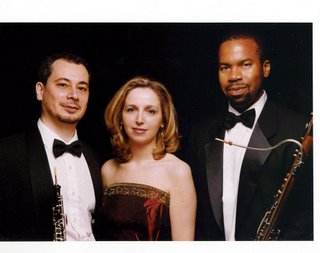Francis Poulenc Trio at the Polish Embassy
 In the absolutely delectable Salon of the Polish embassy – replete with Corinthian pilasters and frize that quickly make you forget the unfortunately looming metal detector downstairs – the Embassy Series presented the Baltimore based Poulenc Trio consisting of oboist Vladimir Lande (see Ionarts review from a New York Bachanalia Festival), bassoonist Bryan Young and pianist Irina Lande. Wind trios are rare enough, dedicated ones rarer still – so it was no surprise to be confronted with works that were, Poulenc’s trio apart – entirely new to me and like most other attendees.
In the absolutely delectable Salon of the Polish embassy – replete with Corinthian pilasters and frize that quickly make you forget the unfortunately looming metal detector downstairs – the Embassy Series presented the Baltimore based Poulenc Trio consisting of oboist Vladimir Lande (see Ionarts review from a New York Bachanalia Festival), bassoonist Bryan Young and pianist Irina Lande. Wind trios are rare enough, dedicated ones rarer still – so it was no surprise to be confronted with works that were, Poulenc’s trio apart – entirely new to me and like most other attendees.
Mikhail Glinka’s Trio Pathetique in d-minor opened the evening with its unisono introduction to give way to a very un-russian, at first Germanic then more Italianate trio where melancholic sounds softly lapped ashore only to be undermined by an occasional lively sprint. Outside Russia, it is Glinka’s fate to be known for the influence on the music of others, not for his own. (His most important work is probably his opera “A Life for the Tsar” – and that is hardly ever programmed in American – or West-European – houses.) The trio may not change that any time soon, but it makes for an exquisite chambermusic-making. Certainly when played so well as did the present trio… especially oboe and bassoon, pleasing with great precision and a good, clear tone. Vladimir Lande, already benefactor of the best melodic lines in all of these works, managed one stand-out performance after another. Irina Lande’s playing, too, was near-flawless, but it was also monochromatic, a bit stilted and never went above mere accompaniment, not even in later, more virtuosic sections.
A lighter charmer was Polish-German Maurice Moszowski’s Suite in g-minor for two violins and piano (arranged accordingly) from which the Lento assai and the Allegro moderato were played. Nothing dramatic in either of those two movements, but plenty fun, both. A potpourri from Rossini’s L’Italiana in Algeri (on the WNO’s program this season) was forced into woodwind trio shape by Parisian oboe and bassoon players Eugene Jancourt and Charles Tribert: a brilliant little thing. André Previn, German born American of Franco-Russian descent, is musically no less a melting pot than culturally. Having started out a jazz player and film music composer, it’s not surprising that he should well be able to combine the popular, jazz and classical idioms. The stimuli behind his compositions usually have long legs. Some guys buy flowers, André throws off a little composition for the lasses. A violin concerto sealed the deal recently, in 1994 it probably did the trick with a Pittsburgh Symphony bassoonist he coveted. Still, if the resulting Trio for Oboe, Bassoon, and Piano with its movements Lively, Slow, Jaunty had the desired effect on his double reed de jour, it doesn’t yield much, musically, to these ears. Maybe the long solo-piano passages could have been played in a more freewheeling, jazzy style – but even then they would unlikely have been a snug fit with the rest of the music. The ‘jazz parts’ felt contrived and never part of the whole. Composing in a jazz style is apparently very difficult – and when it is done well (not often – but for example with Nikolai Kapustin) it is murderously difficult to play.
Someone who was more successful at that idiom than Mr. Previn was Francis Poulenc… and tellingly without the later ever even trying hard. Perhaps being around the whimsical, irreverent music of his mentor and friend Eric Satie (to whom Poulenc’s trio is dedicated) was enough… the result, at any rate, as in most of Poulenc’s chamber music, is a precious work that is very much classical music while never taking itself too serious. The easygoing, natural charm of Poulenc’s music and this trio in particular is disarming. Beautiful but not denying its 1926 birthdate, it’s earnest – but winks at you throughout. I wouldn’t go as far as ascribing ‘silliness’ to it, but the trio understands a good joke as much as it likes to tell one. Outstanding fun, outstandingly played: Little wonder the group christened itself after this gem… little wonder the audience demanded an encore to which the three players obliged, despite the seductive wafts of a fabulous buffet from the adjacent room already tickling their noses. That Handel was good; the reception easily its equal. Its thoughtfulness and attention to detail reflected well on the Polish embassy, creating many a fuzzy thought about Poland, even as Polish Government and Central bank are trying everything to ham it up at the home-front.




















































